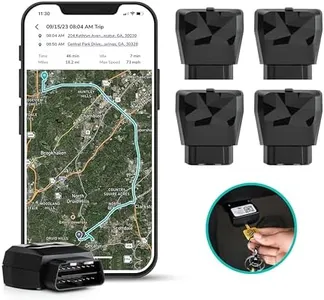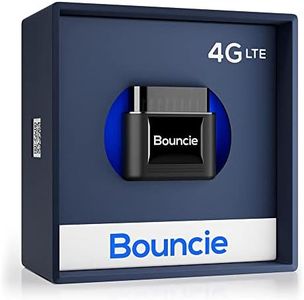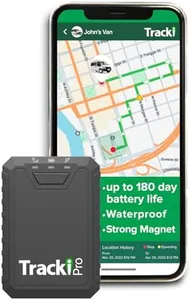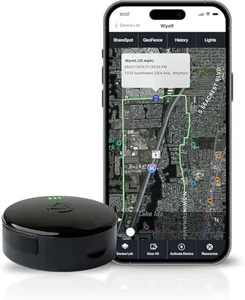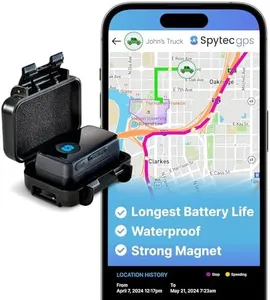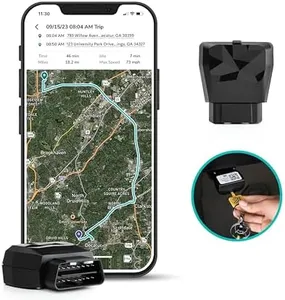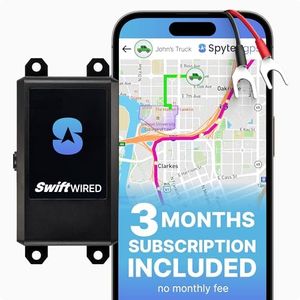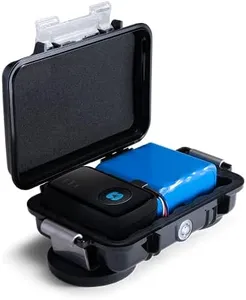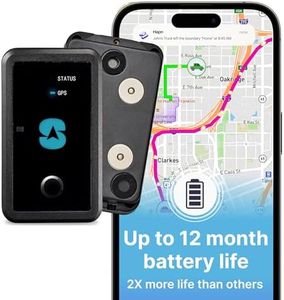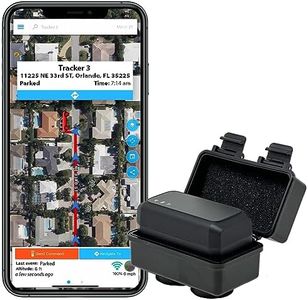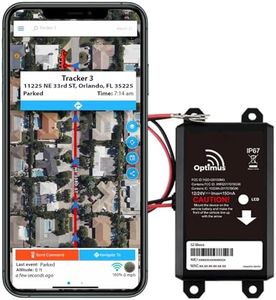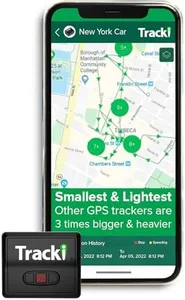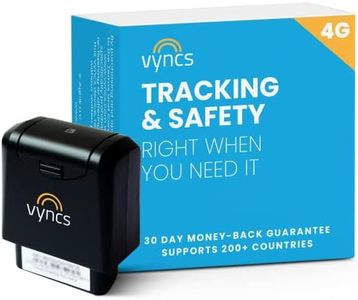10 Best Car Trackers 2025 in the United States
Our technology thoroughly searches through the online shopping world, reviewing hundreds of sites. We then process and analyze this information, updating in real-time to bring you the latest top-rated products. This way, you always get the best and most current options available.

Our Top Picks
Winner
Bouncie - GPS Tracker for Vehicles, Vehicle Location, Route History, Speed Monitoring, Accident Notification, GeoFence, No Activation Fees, Cancel Anytime, Family and Fleets
Most important from
5702 reviews
The Bouncie GPS Tracker is a reliable option for anyone looking to keep tabs on their vehicle's location. With its real-time tracking feature, you can easily monitor where your car is at any time, which is especially useful for families wanting to keep track of their teens or businesses managing a fleet. The tracker also provides insights into driving habits, alerting you to unsafe practices like speeding, which enhances safety for both personal and professional use.
One of the standout features is the geofencing capability, allowing you to set up zones that notify you when your vehicle enters or exits specific areas. This is particularly beneficial for businesses that need to ensure their drivers are adhering to designated routes. Additionally, the tracker continuously monitors vehicle health, alerting you to potential maintenance issues, which can save time and money on repairs.
Installation is a breeze since it plugs directly into the OBD2 port of most vehicles without requiring tools—making it accessible even for those who aren’t tech-savvy. However, it does come with a monthly subscription fee of $9, which might be a consideration for users who prefer no ongoing costs. While there are no activation or hidden fees, some might find the subscription model less appealing if they only need temporary monitoring. The device’s coverage and connectivity is generally good, but can vary depending on your location. In summary, the Bouncie GPS Tracker is well-suited for families and fleet operators looking for an easy-to-use, feature-rich solution for vehicle tracking and monitoring. It provides valuable insights and notifications, but potential buyers should weigh the subscription cost against their specific needs.
Most important from
5702 reviews
Tracki Pro GPS Tracker for Vehicles, USA made tech. Up to 7 Months Batt. Waterproof Magnetic 4G LTE Long Battery Life 2-7 Month, Unlimited Distance, Subscription Required, Multi Alerts, Hidden Tracker
Most important from
1577 reviews
The Tracki Pro GPS Tracker is designed specifically for vehicle tracking, making it a solid choice for individuals and businesses looking to monitor their vehicles' locations in real-time. One of its standout features is its impressive battery life, offering up to 7 months on a single charge, depending on usage. This is significantly longer than many competitors, thanks to its large 10,000mAh battery. The device is also waterproof and comes with a strong magnetic attachment, allowing for discreet placement under a vehicle, which is an excellent feature for anti-theft purposes.
In terms of connectivity, the Tracki Pro supports 4G LTE coverage, along with fallback options to older 3G and 2G networks, ensuring it remains functional in various locations. This extensive coverage is beneficial for users needing reliable tracking across different regions or countries, as it offers worldwide service in over 180 countries. Additionally, the device includes advanced features like geofencing, alerts, and notifications, which can be delivered through a smartphone app, SMS, or email, helping users stay informed about their vehicle's movements.
While the Tracki Pro has many strengths, there are a few considerations to keep in mind. The tracker requires a monthly subscription fee, which can be a drawback for some users. Though the long-term subscription option can lower costs, it's essential to factor this recurring expense into your budget. The user interface may present a learning curve for those not as tech-savvy. Lastly, while the tracker is user-friendly to set up, some may find the need for additional accessories — like mounts or tapes — somewhat cumbersome.
Most important from
1577 reviews
LandAirSea 54 GPS Tracker - Made in the USA from Domestic & Imported Parts. Long Battery, Magnetic, Waterproof, Global Tracking. Subscription Required
Most important from
25527 reviews
The LandAirSea 54 GPS Tracker offers a solid set of features for those looking to keep track of their vehicle or other assets. It excels in real-time tracking with location updates as frequent as every 3 seconds, which is quite impressive for ensuring you have constant awareness of your tracker’s location. The geofencing feature is also a plus, offering alerts when the tracker enters or exits designated areas. The device is compact, waterproof, and has a built-in magnet, making installation straightforward and allowing for discreet placement on various assets.
Additionally, the tracker supports 4G LTE connectivity, ensuring reliable coverage and connectivity across a broad range of locations. The SilverCloud app and web-based software provide user-friendly interfaces for tracking and historical data review, with data stored for up to a year, which is quite beneficial for those needing long-term tracking records. However, the battery life, while extended through motion-activation, might require frequent recharging if the tracker is in constant use.
Another potential downside is the necessity for a subscription plan, which, although starting at a reasonable $9.95 a month, represents an ongoing cost that users must consider. Additionally, while the product is robust and backed by a lifetime warranty, the initial cost combined with subscription fees could be a deterrent for some users. The LandAirSea 54 is a reliable and feature-rich GPS tracker suitable for those needing precise and real-time tracking, particularly useful for vehicle and asset tracking.
Most important from
25527 reviews
Buying Guide for the Best Car Trackers
Choosing the right car tracker can be a crucial decision for ensuring the safety and security of your vehicle. Car trackers come with various features and specifications that cater to different needs, whether it's for personal use, fleet management, or theft prevention. Understanding these specifications will help you make an informed decision and select the best tracker for your requirements.FAQ
Most Popular Categories Right Now
